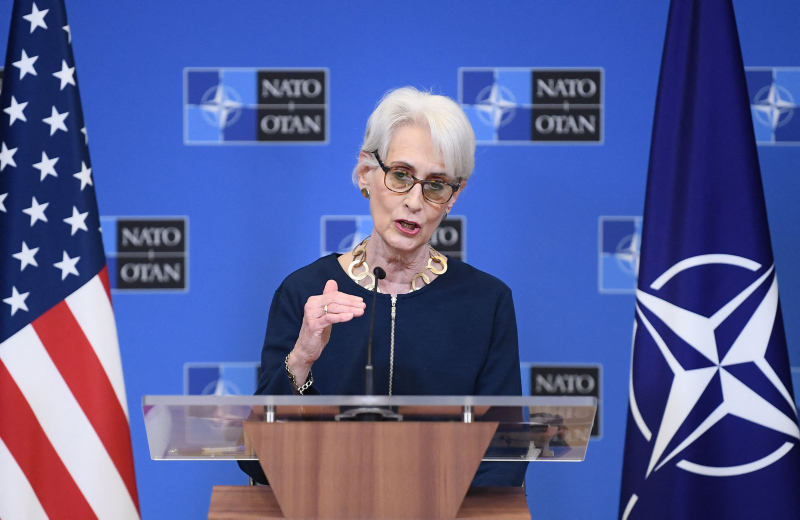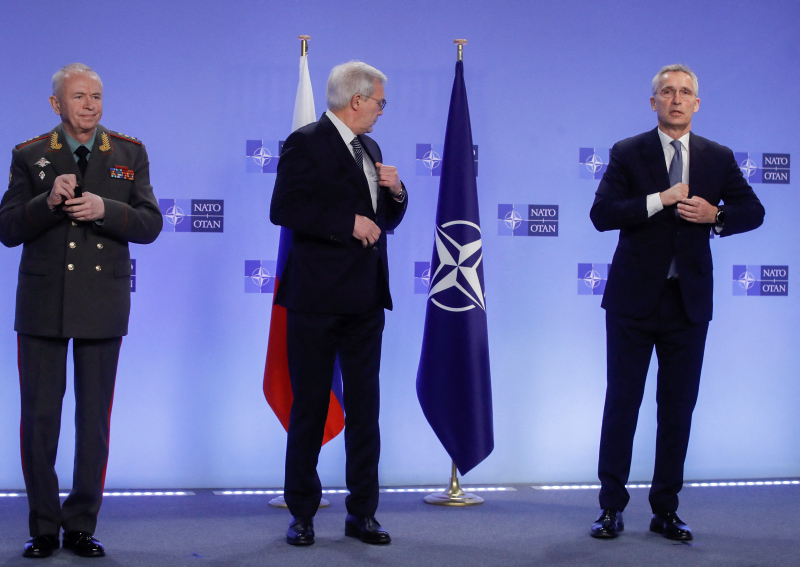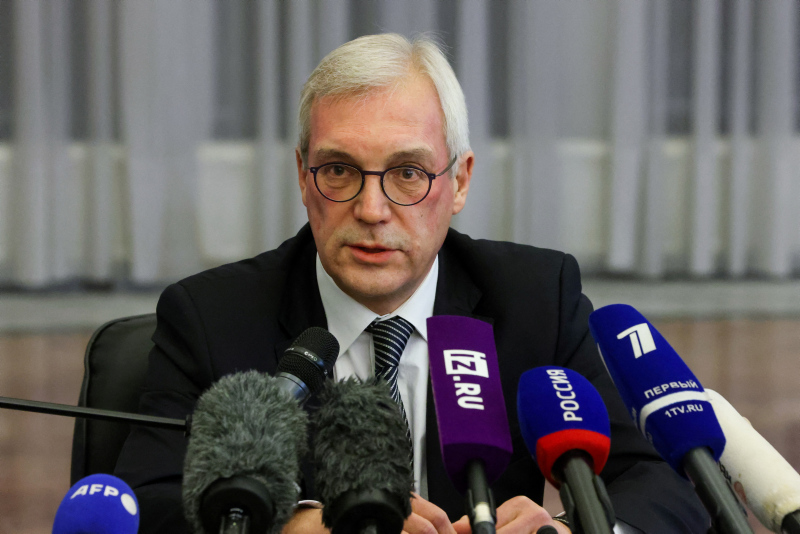NATO Secretary-General Jens Stoltenberg said Wednesday that the military organization and Russia have agreed to try to set up more meetings to ease tensions between them amid deep concern in the West about whether Moscow might order an invasion of Ukraine.
Speaking after chairing a meeting of the NATO-Russia Council, Stoltenberg said both parties had "expressed the need to resume dialogue and to explore a schedule of future meetings."
He said that the 30 NATO countries want to discuss ways to prevent dangerous military incidents, reduce space and cyber threats, as well as arms control and disarmament, including setting agreed limits on missile deployments.
But Stoltenberg said that any talks about Ukraine wouldn't be easy.
"There are significant differences between NATO allies and Russia on this issue," he told reporters, after what he said was "a very serious and direct exchange" with Russian Deputy Foreign Minister Alexander Grushko and Deputy Defense Minister Alexander Fomin.
Stoltenberg underlined that Ukraine has the right to decide its future security arrangements on its own, and that NATO would continue to leave its door open to new members, rejecting a key demand by Russian President Vladimir Putin that the military organization halt its expansion.
"No one else has anything to say, and of course Russia does not have a veto," he said.
The NATO-Russia Council was the first meeting of its kind in over two years. The forum was set up two decades ago but full meetings paused when Russia annexed Ukraine's Crimean Peninsula in 2014. It has met only sporadically since, the last time in July 2019.

U.S. Deputy Secretary of State Wendy Sherman also underlined that any European country should have the right to join NATO if it wants to.
"I reaffirmed the fundamental principles of the international system and of European security: Every country has the sovereign right to choose its own path," Sherman tweeted as the meeting, which ran for over three hours, drew to a close.
In the news conference after the meeting, Sherman said that Russia did not bring something new to the meeting with NATO on Wednesday, but that it is important that it did not reject the idea of further discussions.
"What ... I think Russia heard loudly and clearly from all allies today is it's very hard to have dialogue, to have diplomacy that is conducive to success when in fact you have 100,000 troops live-fire exercises, propaganda, disinformation, other efforts to subvert that environment," she added.
Sherman urged Russia to stay at the negotiation table, telling reporters "If Russia walks away... it will be quite apparent they were never serious about pursuing diplomacy and that is why collectively we are preparing for every eventuality," underlining that Russia is the one that needs to choose between diplomacy or confrontation and consequences.
Sherman also underlined that Russia's stance on the Ukraine issue will play an important role in the fate of the Nord Stream 2 pipeline, which is planned to transport natural gas from Russia to Germany.
"From our perspective, it's very hard to see gas flowing through the pipeline or for it to become operational if Russia renews its aggression on Ukraine," she said.
The pipeline, which is not yet operational, undermines the energy security and the national security of a "significant part of the Euro-Atlantic community", she added.
Sherman noted that Russian live-fire exercises near the Ukraine border while Moscow holds talks on de-escalation with the United States and NATO were meant to intimidate and create a threat.
"It's very hard for me to know what is in mind of President Putin. What I will say is there's no doubt it's meant to intimidate, it's meant to coerce it's meant to create a threat, to put pressure, to create a crisis," Sherman said in an interview with MSNBC from Brussels after talks with Russia and NATO.
State Department spokesperson Ned Price was also among the ones who commented on the talks, saying "No one should be surprised if Russia spreads disinformation about commitments that have not been made after talks with the United States, or if it instigates something as a pretext for more destabilization in Ukraine."
"We urge everyone not to fall for Moscow's continuing disinformation," Price told reporters, adding the U.S. is comparing notes with its allies to figure out how best to continue dialogue with Moscow regarding Ukraine.
The talks come during a week of high-stakes diplomacy and a U.S.-led effort to prevent preparations for what Washington believes could be a Russian invasion of Ukraine. Moscow denies it is planning an attack. Still, its history of military action in Ukraine and Georgia worries NATO.
Russia has around 100,000 combat-ready troops backed by tanks, artillery and heavy equipment massed near Ukraine's eastern border.
Putin says Russia's demands are simple, but key parts of the proposals contained in the documents that Moscow has made public — a draft agreement with NATO countries and the offer of a treaty between Russia and the United States — won't pass muster at the 30-country military organization.
NATO would have to agree to halt all membership plans, not just with Ukraine, and scale down its presence in countries like Estonia close to Russia's borders. In exchange, Russia would pledge to limit its war games, as well as end aircraft buzzing incidents and other low-level hostilities.
Endorsing such an agreement would require NATO to reject a key part of its founding treaty. Under Article 10 of the 1949 Washington Treaty, the organization can invite in any willing European country that can contribute to security in the North Atlantic area and fulfill the obligations of membership.
In Moscow earlier, Kremlin spokesman Dmitry Peskov warned that Russia expects a quick answer.
"The situation regarding European security and our national interests has reached a critical line," Peskov said in a conference call with reporters, and he branded the organization "an instrument of confrontation."
"The alliance has been conceived as such, and it's how it has been organized and is developing now. It's quite obvious, so the expansion of this mechanism poses a threat to us," he said.
He declined to say what measures Russia might take if talks fail, saying that Moscow "wouldn't like to issue threats and ultimatums and warn that others will pay a high price, as U.S. officials do," Peskov said.

Russian Deputy Defence Minister Alexander Fomin, on the other hand, said after talks with NATO in Brussels on Wednesday that Moscow had offered de-escalation measures to the U.S.-led alliance, but that NATO had ignored them, according to Interfax news agency.
Fomin said that NATO ignoring the proposed measures created the grounds for incidents and conflicts, Interfax said.
Russia's Defence Ministry was quoted separately by TASS news agency as saying that Russia was counting on constructive security talks with NATO.

Russian Deputy Foreign Minister Alexander Grushko also made some remarks about the issue saying that Wednesday's talks with NATO in Brussels had been open and direct, and warned that a further worsening of ties could bring unpredictable consequences for European security.
He accused NATO of striving to contain Russia and gain superiority in all areas, describing the U.S.-led alliance's behaviour as creating unacceptable risks for Russia. There was no positive agenda between Moscow and NATO, he said.
Grushko said he could not recall such a frank and sharp discussion with NATO as Wednesday's talks in Brussels, and that Moscow felt it could not concede more ground to the U.S-led alliance in certain areas.
He said Russia told NATO that the situation could not remain as it currently is, and that Moscow wanted to find a way out and that Russia did not take NATO's statements of its peaceful purpose seriously.
He said various NATO positions were unacceptable for Moscow.
Grushko underlined that it would be possible to de-escalate tensions over Ukraine, but that NATO had to understand that the risks posed by it adding more members outweighed the possible advantages.
He said avoiding dangerous situations was the main aim at Wednesday's discussions between NATO and Russia, reminding NATO's expulsion of Russian diplomats last year was unacceptable and that Moscow would take all measures to prevent any damage to Russian security interests.
The general situation is very dangerous and it is not yet clear how to overcome obstacles to make progress, he added.
He noted that Moscow wanted written answers from NATO on its proposals for sweeping security guarantees and to hear from the alliance how it would implement them or - if not - why it could not do that.
Moscow would then be able to decide its course of action, Grushko said, warning that NATO could not simply cherry-pick security proposals from the list laid out by Russia.
Russia is also ready to discuss strike weapons with the U.S.-led NATO alliance, including their locations and verification measures, Grushko underlined, stating that it would become clearer what comes next once NATO presented its own proposals. He said it was good that both sides had spoken so frankly to one another.
Grushko finally highlighted that Moscow would use military means to neutralise threats to its security if political means did not prove enough, Interfax news agency reported.